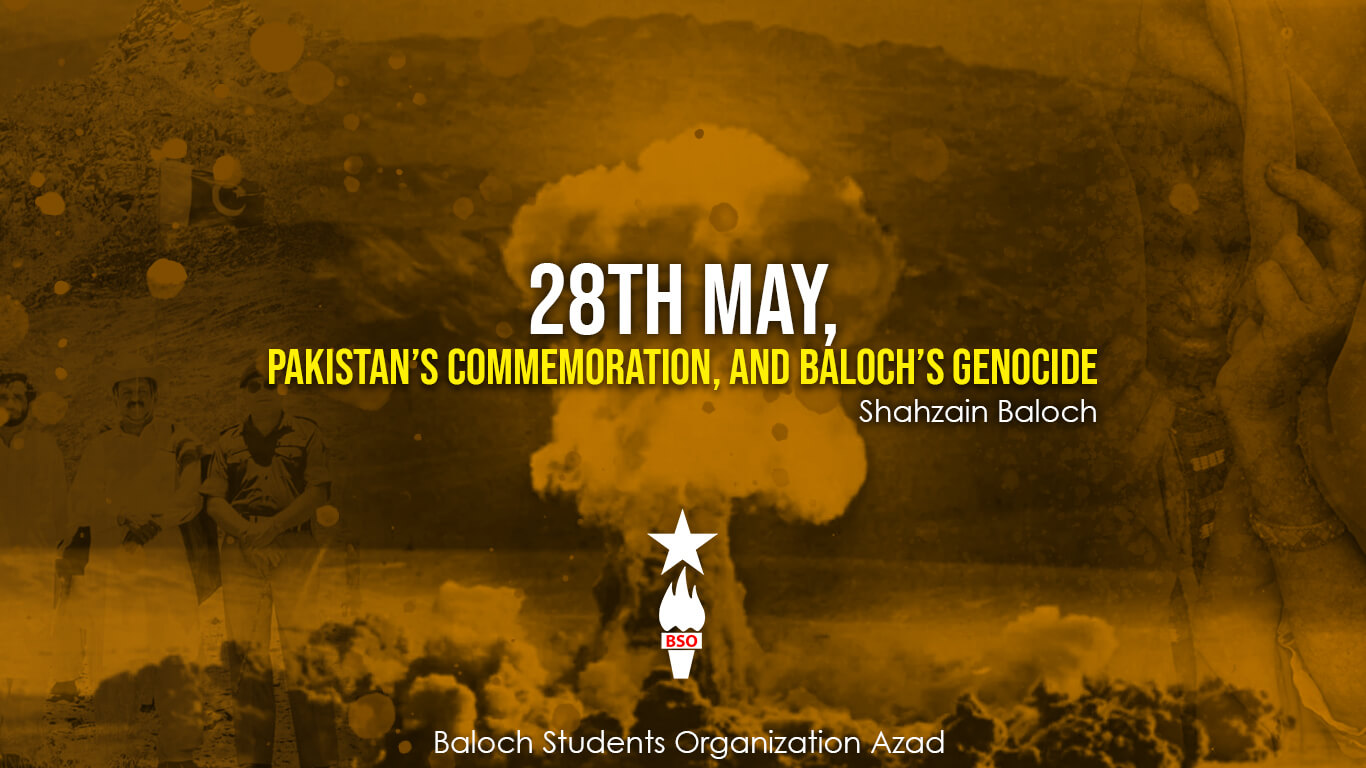28th May, Pakistan’s commemoration, and Baloch’s Genocide
Shahzain Baloch
28th May 1998, Pakistan’s decision to conduct its inaugural nuclear test in Chaghi Balochistan. This was not merely a demonstration of military might but a calculated political act with grave implications for the Baloch people. The choice of location underscores a broader strategy of systemic oppression, reflecting the State’s disregard for the environmental and humanitarian costs inflicted upon Baloch region. Punjabi may celebrate the nuclear testing as a national triumph but for Baloch it is the continuation of the political marginalization and exploitation of Baloch populace, emblematic of the State’s ongoing efforts to suppress Baloch identity under the pretext of national security. Balochistan, a region already struggling with numerous socio-political issues, is now encumbered by the presence of nuclear testing site.
The worst part is that on the morning of May 28, 1998, the people of Balochistan experienced an unusual unease in their eyes. From the coast of Balochistan to the Koh-e-Sulaiman region, the populace remained unaware of the radiation wave resulting from Pakistan’s nuclear test at Raskoh. The absence of media and lack of education, awareness and communication hindered the public from understanding the ramifications of this radiation on their environment. Even today cancer and skin diseases are widespread in Balochistan, specially regions affected by the nuclear testing. Although the mountain range surrounding Raskoh was purported to be uninhabited, the tests rendered the area into a depopulated wasteland, with rivers and water sources contaminated by the nuclear fallout. The mountain range turning white due to the nuclear tests.
Historical Background:
In the early 1970s, Following India’s emergence the sole nuclear power in South Asia, Pakistan initiated its nuclear weapons program. Prime minister Zulfiqar Ali Bhutto, leading Pakistan at the time, famously said, “We will eat grass later but we will make a nuclear bomb”. Shortly before the 1998s test, the Pakistani government declared it had selected an uninhabited area in Chaghi for the tests. However, in 2014, a master thesis, titled “Impacts of nuclear tests on Chaghi, written by Abdul Raziq. In this thesis Raziq reveals that the location was actually a village, not deserted as claimed. Raziq documents that the detonations occurred on a mountain in the Raskoh mountain range(Koh-e-Kamran), specifically in the village of Chehtar in Chaghi. While the government asserted that there were “only ten households were near the test site, who were relocated to a safer place,” Raziq contends that numerous households were in proximity to the site, and even if the tests were conducted one kilometer from the ten households the government claimed to have moved, it would not have ensured their safety. “four thousand people were affected by the blasts,” he writes. “The government also failed to provide support to the displaced and dislocated residents.”
When Balochistan was burning due to the nuclear test, the so-called representatives of Balochistan were commending the state for this action. For instance, the puppet prime minister of Balochistan at that time Akthar Mengal said that “The nuclear explosions have lifted our heads in pride.” And Senator Sana Ullah Zehri of the ruling party applauded them.
The Disastrous After-Effects of Nuclear Test:
The population of Chaghi in Balochistan has developed genetic abnormalities. This was not always the case. The situation deteriorated after May 28, 1998, when Pakistan, in response to India’s Pokharan-2 tests, conducted a series of nuclear detonations. These tests were executed hastily, without the necessary precautions and ground assessments, leading to the devastation of future generations.
Due to the nuclear testing in Chaghi, the children are born with genetic problem such as facial deformities, eye problems, skin diseases, and limb dysfunction. “This has caused a series of damage to the flora and fauna of the area thus resulting to the radioactive effect to every level of ecosystem and hence affecting the human beings who inhabited there,” says Sheer Mohammad Bugti, chief Spokesperson of Balochistan Republican party. He adds, “Pakistan has never been worried about the people of Baluchistan, but has only used the land of prosperity for its good only.
Due to nuclear tests conducted by Pakistan, the radioactivity has gone into the very soil of the area and has contaminated the ground water. The people who once inhabited the Chaghi, are now migrating for better shelter in Pakistan, where they are treated as enemy only. Out homed from their native land, they are left to live a miserable life.
This nuclear testing may be embodying milestone for Pakistan and its scientific capabilities and a turning point for its geopolitical stance but it has cast a long shadow over the life of Baloch people and Balochistan, where a normal life is missing.

